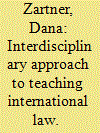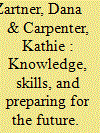|
|
|
Sort Order |
|
|
|
Items / Page
|
|
|
|
|
|
|
| Srl | Item |
| 1 |
ID:
090261


|
|
|
|
|
| Publication |
2009.
|
| Summary/Abstract |
As the world has grown more interconnected, many political science programs have added courses on international law, international organizations, the laws of war and peace, international human rights, and comparative judicial politics. While in many cases these are relatively new offerings within international studies, all of these subjects have long been part of the law school curriculum. There is, therefore, a long pedagogical history to be examined in terms of the techniques and content used in law schools to teach these courses. This paper examines a number of these techniques and discusses how they may be used in political science courses to enhance student learning opportunities.
|
|
|
|
|
|
|
|
|
|
|
|
|
|
|
|
| 2 |
ID:
159417


|
|
|
|
|
| Summary/Abstract |
Higher education is at a point of transition. Colleges and universities are considering new ways to attract students through innovative programs that stay true to their educational mission and also prepare students for the current job market. Employers consistently talk about the skills they need in graduates they hire, including critical thinking, strong writing, adaptability, and cultural competency. International studies as a major is perfectly poised to provide students with both the academic grounding they need to better understand the world around them and the skills necessary to make them desirable to employers. Communicating the skills and content that coursework in the major offers, however, is often not a straightforward process. Students have both skills and content knowledge, but two key issues need to be addressed: (1) how can faculty better communicate to students the skills and knowledge we want them to gain from our classes, and (2) how do we enable students to understand and articulate these skills to future employers? This article addresses these questions by examining the contributions of international studies with regard to building skills in the classroom, enhancing cultural competency, promoting language training, developing networking capacity, and preparing students for life after college.
|
|
|
|
|
|
|
|
|
|
|
|
|
|
|
|
|
|
|
|
|